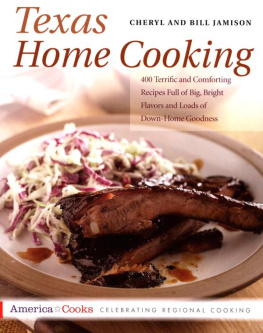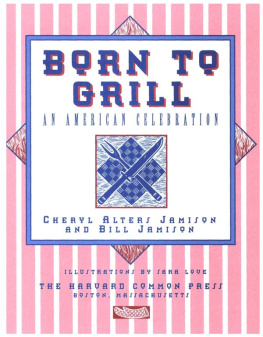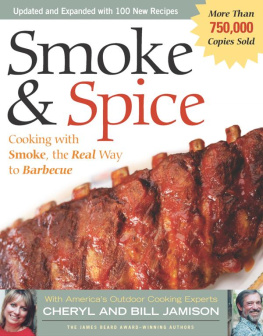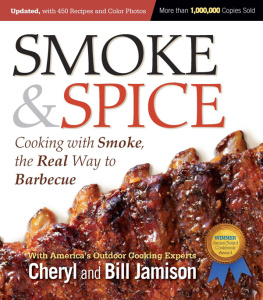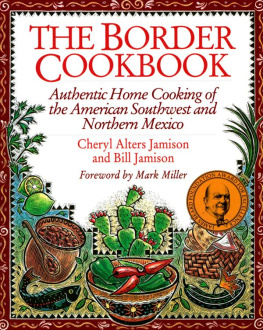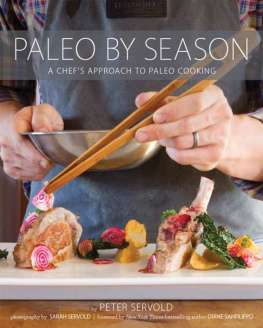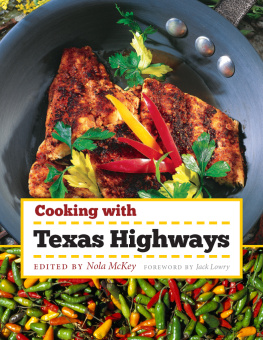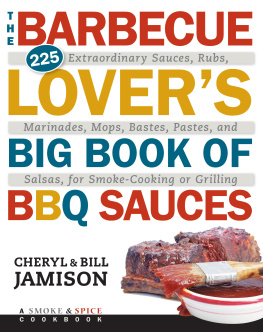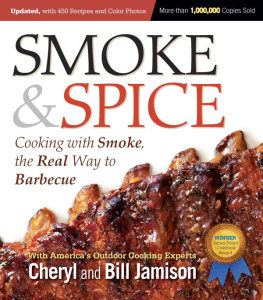THE HARVARD COMMON PRESS
535 Albany Street
Boston, Massachusetts 02118
www.harvardcommonpress.com
Copyright 1993 by Cheryl Alters Jamison and Bill Jamison
Illustrations copyright 1993 by Paul Hoffman
All rights reserved. No part of this publication may be reproduced or transmitted in any form or by any means, electronic or mechanical, including photocopying, recording, or any information storage or retrieval system, without permission in writing from the publisher.
Printed in the United States of America
Printed on acid-free paper
Library of Congress Cataloging-in-Publication Data
Jamison, Cheryl Alters.
Texas home cooking : 400 terrific and comforting recipes full of big, bright flavors and loads of down-home goodness / Cheryl Alters Jamison, Bill Jamison.
p. cm. -- (America cooks)
ISBN 978-1-55832-059-8 (pbk.)
1. Cooking, American--Southern style. 2. Cooking--Texas. 3. Cookbooks. I. Jamison, Bill. II. Title.
TX715.2.S68J358 2011
641.59764--dc23
2011016086
Special bulk-order discounts are available on this and other Harvard Common Press books. Companies and organizations may purchase books for premiums or resale, or may arrange a custom edition, by contacting the Marketing Director at the address above.
Cover design by Night & Day Design
Cover photography by Joyce Oudkerk Pool, assisted by Morgan
Bellinger; food styling by Jason Wheeler
Text design by Kathleen Herlihy-Paoli
Illustrations by Paul Hoffman
20 19 18 17 16 15 14 13
for Heather, David, Colby, Tatia, and Britton,
a new generation of Texas cooks and eaters,
and Austin, Krista, B. J., Erik, and Kyle,
the next generation.
What We've Got Cooking
"The very fact that I was in Texas for the sole purpose of eating contradicted my blind but resolute conviction that most food down there was, at best, some form of fodder consumed by asbestos-palated goat-ropers for no other reason than to sustain human life.... Well, to suggest that I now champion the cause of Texas cookery is a triumph of understatementnot to mention an admission of acute guilt and embarrassment.... I need no more convincing that the regional dishes of Texas are not only some of the most inspired in the nation but also some of the most delicious."
James Villas,American Taste
Villas is an unusual fellow, an eater with an open palate. Most of us would rather wrestle a rattlesnake than give up our food biases. This is particularly true when we're talking about Texas, a place where, as everyone knows, it's better to be bowlegged than subtle or fussy.
If you hear the words Texas and cuisine used in the same sentence in culinary circles, it's probably the punch line of ajoke about Paris, Texas. Even many Texans aren't aware of their state's amazing food heritage and the real potentials of its home cooking. In a land of bull-riding cowboys, high-kicking cheerleaders, and bank-bamboozling millionaires, it's easy to conclude that what you trot out to the table is less pertinent than J. R. Ewing's virtues.
We're here to show you different. Texas has more to boast about in the kitchen, contrary to common belief, than in the boardroom, bedroom, or back room. When the traditional dishes of the state are fixed right, they're as full of flavor as foie gras and as hearty as a honky-tonk angel. We're going to treat you to some meals that'll make youlike James Villas, Town and Country editorpull up a table in the amen corner of Lone Star cooking.
Down-Home Food for Contemporary Cooks
A century ago, in 1893, Alice O'Grady brought European refinement to Texas cooking. That was the year she opened the Argyle Hotel in San Antonio, the only place in the bumptious frontier state where ladies and gentlemen could count on proper manners and silverware. In her elegant restaurant, the Irish-born Miss O'Grady served a range of Continental delicacies plus mashed potatoes dyed pink, cakes with elaborate spun-sugar icing, and congealed salads with pastel-tinted cabbage garnishes.
Texas never quite ceases to be Texas, however gussied up it gets. This is particularly true of the food heritage, which has shown the same kind of staying power as a straight flush. Texans, along with everyone else, have grown more cosmopolitan over the past one hundred years but they have never spurned their roots. Like Alice O'Grady, they have simply incorporated new influences into old food traditions, blending with the contemporary world instead of bowing to it. The result at its best, as we feature it here, is down-home fare with flair, more complex and robust than in the past though true to its original inspiration. We don't dye our mashed potatoes, but they'll tickle you pink if you remember mashed potatoes as bland.
Even with our stress on depth and breadth of flavors, our focus remains real home cooking, not just hearty and familiar but also easy to prepare. We respect professional restaurant chefs and their cookbooksand we're happy to apply their ideas and techniques when appropriatebut our recipes don't require a Star Wars kitchen, a staff of twenty, or a week of advance planning. Although we pursue and attain a good measure of the rich, multidimensional qualities we admire in fine restaurants, we don't do demi-glaces.
We also don't do hospital vittles. We take health considerations seriously, and usually manage to cut heavy or rich ingredients without sacrificing flavor, but if that doesn't work we don't compromise goodness. Our own approach is to eat less rather than decimate a beloved dish. Besides, plenty of our country favorites in the cookbook are already as light and wholesome as any health foodjust more wonderfully savory. We frequently make a low-calorie, low-fat, and mighty tasty meal out of several of our "Supper and Side Dishes" served together.
Texas Home Cooking celebrates down-home American eats. The lineage is purely Lone Star in some cases, and much broader in others. Both sorts of dishes make up a delightful culinary legacy that's still as lively as a fiddle tune and as lingering as a slow dance at the prom.
Six Flags and a Dozen Flavors
Texas schools really hammer at the hard facts in history. There's no way you'll graduate from a Texas high school without knowing that the state was a part of six countries at different times. Except for the Republic of Texas, you don't have to name the nations, just count the flags.
Much more important, it seems to us, is the number of cultures that have contributed to the Texas heritage, a figure far higher than six. To begin appreciating the depth and diversity of the state's traditional cooking you need to tally the sourcesnational, ethnic, and social. Even if we ignore important groups of nineteenth-centuiy settlers that had little lasting influence on the foodFrench, Italian, and Japanese, among othersthe list of peoples who made a difference is impressive. You have to look seriously at Mexicans, Upper South frontiersmen, plantation Southerners, Africans, New Orleans Creoles, Cajuns, Czechs, Germans, and cowboys of all hues.
By the nineteenth century, each group established a culinary legacy that not only has survived to the present, but also at some point passed into general acceptance. Today it's easy to imagine a Texan of any background having a Czech kolache for breakfast, a Mexican enchilada for lunch, and for dinner, a Cajun touffe washed down with a Bavarian beer and finished off with a Southern pie. With the possible exception of New Orleans, no place in the country has benefited so much from such an extraordinary mingling of food cultures. This culinary diversity is a side of Texas many people don't know, and one that we'll explore in the recipe chapters through hundreds of anecdotes, tall tales, blatant lies, and plain truths.
Next page
